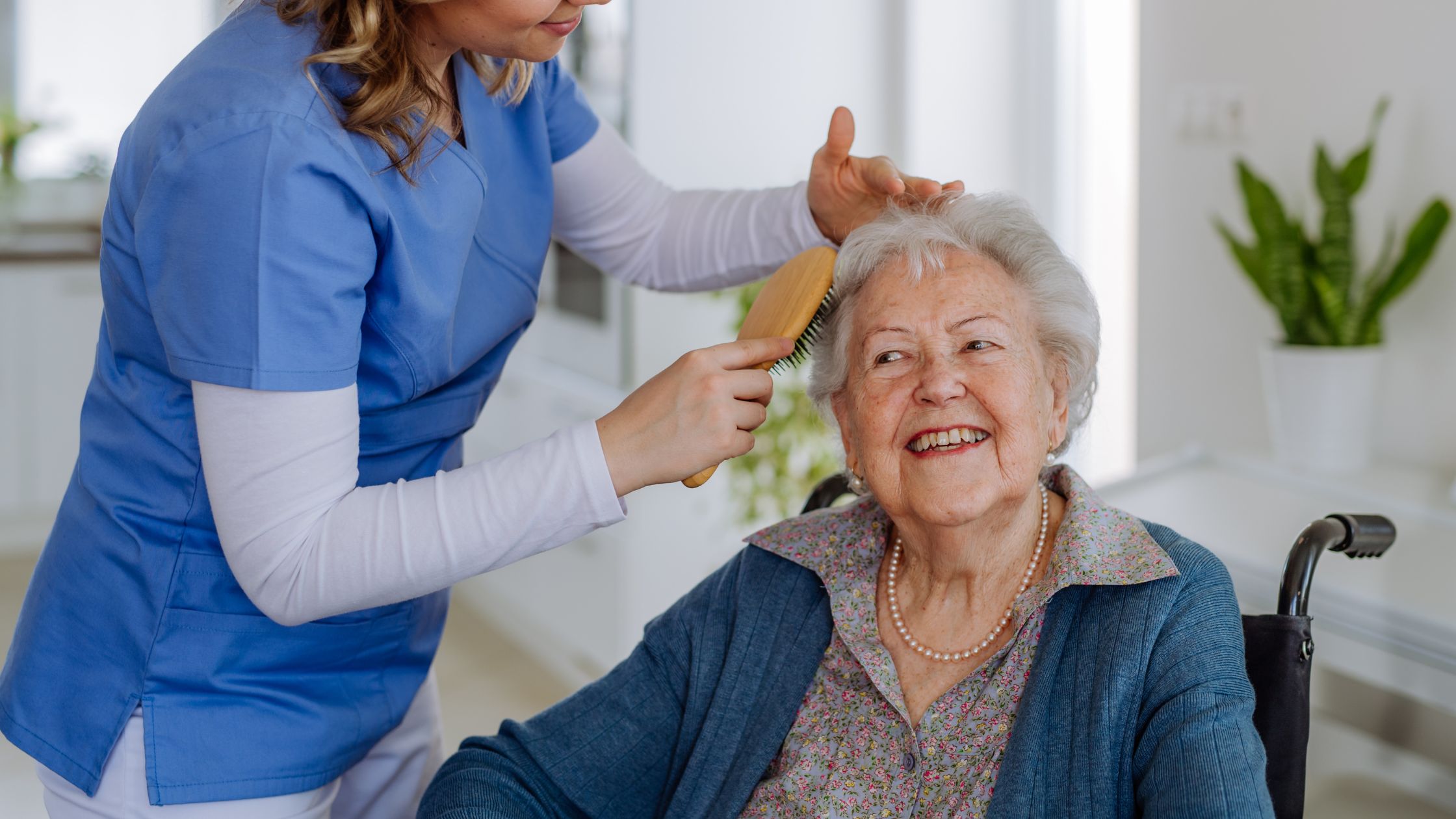Dementia & Alzheimer’s Care in Princeton, NJ — Calm Days, Safer Nights
When memory changes reshape daily life, you deserve support that’s patient, respectful, and truly helpful. Homewatch CareGivers of Princeton provides Dementia and Alzheimer’s care that meets your loved one where they are—at home—so routines feel familiar and confidence can grow. From quiet walks near campus to appointments at Penn Medicine Princeton Medical Center, our local team plans around real life, not just a checklist.
Call Our Princeton Team: (609) 917-9221

What does “good care” look like when memory is changing?
It looks like predictable routines, gentle cueing, and meaningful connection—delivered by people who understand dementia behaviors and communicate with patience. We focus on what still feels strong and familiar, then build the day around those anchors. The result: fewer escalations, safer movement, and more moments that feel like “them.”
Who do we help—and how do we tailor support?
- Adults living with Alzheimer’s disease, vascular dementia, Lewy body, frontotemporal, or mixed dementia
- People experiencing sundowning, wandering, sleep disruption, or anxiety
- Families balancing work, caregiving, and complex schedules who need dependable respite
- Seniors who want to age in place with dignity, structure, and steady companionship
Every plan starts with your story—what a “good day” used to look like, what still brings comfort, and what tends to trigger stress. We then shape care that protects the good moments and gently softens the hard ones.
What’s included in Dementia Care (How & Why it helps)
We combine calm communication, safety know-how, and familiar routines so days stay steady and nights settle.
- Calming Daily Rhythms & Gentle Cueing
How: Set consistent wake/meal/activity times; use short, simple prompts; keep tasks step-by-step with unhurried pacing.
Why it helps: Predictability reduces anxiety and decision fatigue, making care easier to accept. - Sundowning & Behavior Support
How: Soothing activities in late afternoon, low-stim lighting, validating language (“join” vs. “do”), and redirection that protects dignity.
Why it helps: Lowers late-day agitation and prevents avoidable escalations. - Wandering Awareness & Safety Planning
How: Door awareness, safe “walk loops,” ID strategies, clear sightlines, and calm companionship during restlessness.
Why it helps: Preserves mobility while reducing risk and panic. - Personal Care With Dignity
How: Bathing, dressing, grooming, and toileting with privacy, patience, and choices (what first, which shirt); skin checks during hygiene.
Why it helps: Maintains comfort, prevents skin issues, and keeps self-esteem intact. - Mobility & Fall-Risk Reduction
How: Safe transfers (gait belt as needed), tidy pathways, lighting checks, proper footwear, and cueing for position changes.
Why it helps: Cuts fall risk when judgment or depth perception changes. - Nutrition, Hydration & Medication Reminders
How: Familiar foods, finger-food options, small frequent meals, hydration cues, and on-time medication reminders with simple tracking.
Why it helps: Stabilizes energy and mood, and supports clinical plans. - Cognitive & Social Engagement
How: Music, photos, card games, folding, simple cooking, reminiscing, faith/language preferences—matched to attention span and interest.
Why it helps: Sparks connection and reduces isolation without overwhelm. - Sleep & Overnight Support
How: Evening wind-down routines, light stretching, comfort checks, and (when needed) awake overnight monitoring.
Why it helps: Improves sleep quality and makes mornings calmer. - Home Safety & Infection-Control Basics
How: Clutter control, grab-bar recommendations, safe bathroom setup, hand hygiene, and surface wipe-downs.
Why it helps: Keeps the environment safer without making it feel clinical. - Transportation & Appointments
How: Door-through-door rides to clinicians, therapy, and pharmacy; help gathering paperwork; simple visit notes for families.
Why it helps: Reduces stress and ensures follow-through on care plans. - Shift Handoffs & Family Updates
How: Concise, useful notes in Homewatch Connect™—what worked, what changed, what to watch next.
Why it helps: Everyone stays aligned without chasing texts.
Call Our Princeton Team: (609) 917-9221
Why choose us for memory care at home?
Because dementia care isn’t just a skill set—it’s a mindset. We train for both.
- Specialized Training & Certification
Every caregiver completes our HWCG University program and holds Certified Dementia Care training—on top of thorough background and reference checks. - Relationship-Centered Matching
We match for skills and for fit—language, culture, interests—because trust is what makes care work. - Local, Coordinated, Prepared
We plan around Princeton traffic/parking, campus events, and provider networks (Penn Medicine Princeton Medical Center, RWJUH Hamilton, Capital Health – Hopewell) to keep days smooth. - Quality Assurance & Supervision
Periodic check-ins, care-note reviews, and supervisory visits keep quality consistent and responsive.
Support for Family Caregivers (so you can keep being “family”)
Care is easier to accept—and to provide—when everyone has room to breathe. We offer dependable respite, quick coaching on safe transfers and calming strategies, and simple week plans that make the hard days less hard. The goal is steady support for your loved one and sustainable routines for you.
Hospital-to-Home & Changing Levels of Care
Memory changes can complicate transitions. We coordinate with discharge teams, set up medication and hydration cues, stabilize evening routines, and align equipment (grab bars, commode, wheelchair) with therapists. If a move to assisted living or memory care is ahead, we can help plan and orient gently so the new place feels familiar faster.
Call Our Princeton Team: (609) 917-9221
Stay in the loop with Homewatch Connect™
No more wondering what happened today. Our app shares real-time care notes, wellness observations, and time/location check-ins so families stay aligned—especially helpful when siblings coordinate from different cities.
What will it cost and how do we keep it predictable?

We’ll keep pricing clear, options practical, and paperwork painless—so you can focus on care, not math.
- Transparent hourly rates (no surprises).
- A schedule that fits your goals and budget.
- Private Pay made simple.
- Long-Term Care Insurance (LTCI) support.
- Guidance for Veterans’ benefits & NJ Medicaid/MLTSS.
- Documentation that actually helps.
- Sample plan + estimate before you decide.
- Clear minimums and cancellations.
- Regular budget check-ins.
Where we provide Dementia & Alzheimer’s care
Princeton, Princeton Junction, West Windsor, East Windsor, Plainsboro, Montgomery, Skillman, Lawrenceville, Hamilton, South Brunswick, Hopewell, Pennington, Monmouth, Ewing, Kingston.
Near the border? Ask—we often help neighboring communities.
Ready for calmer, safer care at home?
Tell us what a good day looks like now—and what you wish could feel easier. We’ll design a dementia-aware plan that respects your loved one’s history, routines, and dignity, one steady moment at a time.
Call Our Princeton Team: (609) 917-9221